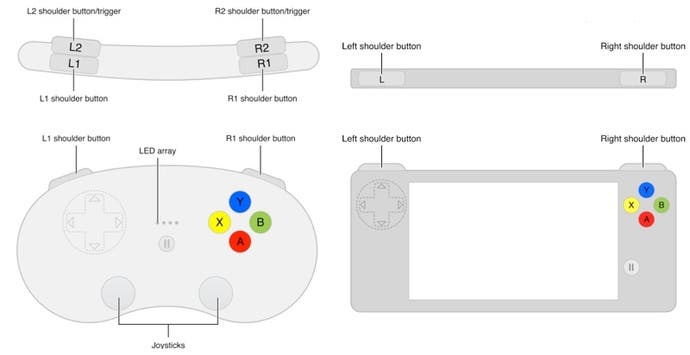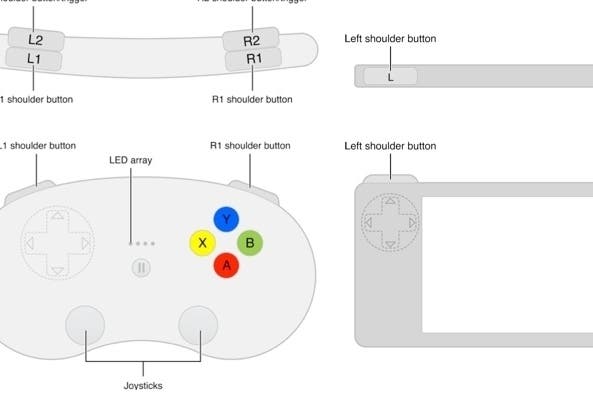Apples and oranges
Why the new Apple controller designs don't point to a consoley future.
There's always been something compelling about the idea of Apple taking an active interest in video games. Steve Jobs used to talk about how Apple existed "at the intersection of technology and liberal arts", which would be an appealing philosophical position for any console manufacturer, and its insistence on controlling "the whole widget" - hardware, software, operating system, network - so it can guarantee a consistent user experience would also work nicely.
Its other strongly held values would be a pretty good fit as well. Look at the company's most recent brand advert and the language is familiar in agreeable ways. "This is it," the narrator explains over a succession of images of people living their lives. "This is what matters. The experience of the product. How it will make someone feel. Will it make life better? Does it deserve to exist? We spend a lot of time on a few great things, until every idea we touch enhances each life it touches. You may rarely look at it, but you'll always feel it."
In many ways Apple's rhetoric about its products is reminiscent of Nintendo's philosophy of making games. "My feeling is that the game designer's role is to create fun and exciting new interactive experiences for people to play," Shigeru Miyamoto explained last month at E3. "What matters is how you feel when you play the game," added Reggie Fils-Aime. It's not too far apart. Both companies operate from a clearly defined set of beliefs that are evident in everything they create.
What's more, hopes that Apple will take a more active interest in games received a boost during E3 week - although they did so thousands of miles away from the traditional industry get-together. Over at Apple's Worldwide Developers Conference in San Francisco, the company revealed reference designs for iOS and OS X gamepads - the idea being that third-party peripheral companies will be bound by these specifications in future, while game developers will be able to use an API that taps into them in a uniform way whatever controller a user buys.
On its own this news is interesting, potentially allowing games with more elaborate console-style ideals to exist more comfortably on touch devices and Mac computers. But it also arrived against a backdrop of persistent rumours Apple is planning to relaunch its Apple TV device. The existing model just acts as a go-between for Apple devices or media services by hooking them up to an HDTV, but a redesigned version could include smartphone-style components capable of running apps natively. Put all these pieces together and it's easy to get excited, as some people have.
All the same, I can't help feel this is a bit of a red herring, for a few reasons. The first devil in the detail is that the developer guidelines are very clear that any game supporting the controllers must also be playable without them. On an iOS device, this means the game must still work using touch controls and integrated sensors, while OS X games must work with keyboard and mouse. This isn't just a requirement affecting things like menus, either - it's about the core experience of playing the game. "Either way, controllers must enhance gameplay," the documentation states. "They must not be required."
This is a critical point that would restrict game designers from going 'full console', if you like, while it also upsets any suggestion that the controllers could talk directly to a new Apple TV device, which might have become a handy micro-console without the need for an intermediary smartphone or tablet. Unless Apple plans to amend these guidelines and its newly launched API to coincide with the release of this rumoured new take on Apple TV, it all adds up to less of a disruptive innovation and more of a modified version of AirPlay.
It seems more likely, to me at least, that the decision to standardise controllers was taken because it removes the lack of uniformity in one-off or unauthorised iOS and OS X peripherals. By bringing order to the third-party peripheral market that exists around its products, the consumer experience will become simpler and more intuitive - something that Apple evidently values. The fact that these reference designs are intended for third parties is also instructive, because if Apple were seriously interested then surely it would make something of its own.
Expending serious time and effort on games also seems out of character for Apple for the simple reason that it is already deeply involved in games. As we heard during WWDC, GameCenter now has over 240 million users, while the iTunes App Store isn't exactly short of games - in fact, they have been among the richest beneficiaries of the more than $10 billion Apple has paid out in app royalties over the years.

Apple is such a big corporation now that its new projects have to achieve enormous scale, bringing in many hundreds of millions of dollars in revenue, in order to move the needle. But Apple's existing position in games means that any Apple TV and gamepad micro-console approach would be an extremely marginal, incremental new business - something the company rarely favours.
The other reason that getting deeper into games seems out of character, though, isn't that, and nor is it Steve Jobs' famous disinterest in video games - John Carmack once complained to me that "Steve Jobs doesn't care about games", suggesting this was the reason Apple's founder focused on things like iTunes instead. Even if Jobs had grown up loving video games rather than hoarding Bob Dylan bootlegs, however, I doubt it would have made very much difference.
The crux of the matter is that Apple doesn't seek to be a content company, forever positioning itself to enable creators and publishers rather than to be one itself. Having already assumed that position in relation to games - with great success - there isn't much headroom for the company to explore without moving away from these convictions about how to operate. New CEO Tim Cook may not be Steve Jobs, but he has followed his predecessor's line on this: Apple needs access to great content, he says, but does not need to own it.
As games continue to become a more influential part of everyone's lives, it's inevitable that Apple's products will continue to support them and help them to flourish. But as much as it's tempting to imagine the company creating something that specifically favours them, it would be so out of character for so many reasons that it feels like a foregone conclusion that it won't. I would love for that not to be the case, because I enjoy Apple products and I generally like the way they go about things, but I suspect the very reasons they are successful also preclude the kind of action that it's always tempting to daydream about.





-3-31-23-screenshot.png?width=291&height=164&fit=crop&quality=80&format=jpg&auto=webp)




